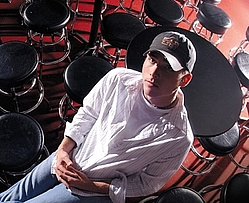Биография Luke Stricklin
For a young man, Luke Stricklin has seen quite a lot. A small town kid from Arkansas who gave 12 months to the streets of Baghdad, Stricklin has lived a lifetime in just under 23 years. And that dichotomy is one of several that not only defines an emerging country artist, but infuses his debut album with unexpected meaning. The story of "American By God's Amazing Grace" has been told on news outlets ranging from CNN and Fox News to Newsweek and The Today Show. First recorded through a $10 microphone on a laptop in the heart of the Iraqi capital, the song bounced to country stations nationwide via email and strong word-of-mouth buzz. Within days of his return stateside, the soldier who co-wrote and recorded it was performing for crowds and signing a record contract. But beneath that feel-good-story-of-the-moment is the subtle yet startling duality of the song itself. Title aside, it's no simple-minded polemic or rally anthem. An affirmation to be sure, but one sung from the reluctant perspective of someone who's lived the unspeakable. Described by the Village Voice as "a howl from the cement bunker, lined by just a hint of confusion and insecurity," the track book ends the album with an almost haunted honesty. "I saw my fair share of death," Stricklin says of his time overseas. "More than I'd liked to have seen. But the hardest part is knowing your loved ones are at home worrying about you. I'd been over there several months and every time I called home my family or my wife asked what it was like...but I wouldn't tell them. Finally I decided to write a song to answer those questions, and that's all this was ever supposed to be." Had the story ended there it would have been no less remarkable, standing on its own as the kind of transcendent artistic missive born solely in the flames of mankind's most brutal endeavor. Again, however, the recurring polarity of Stricklin surfaces in a well-crafted and thoroughly inspired album that proves him to be more than that singular flash of creativity. His ability to make such a prodigious leap has its roots in fairly improbable childhood ambitions. "Music and being in the Army are the two things I wanted to do most," Stricklin says earnestly "from the time I was really little." Born in Arkadelphia, Stricklin grew up on the rural routes of small towns like Curtis and Van Buren, playing on the river and hunting with family. His father died when he was 11, but instilled a love of hardcore country music in his son nonetheless, offering not only an appreciation for Hank Williams, Jr., Waylon Jennings, Keith Whitley and Merle Haggard, but an early guitar as well. Five years of piano lessons gave way to an affinity for drums. As a teen he developed a passion for songwriting. At the same time, Stricklin was becoming an accomplished drummer and played for his well-regarded high school jazz band. Even as he watched fellow musicians move on to college scholarships and careers in music, Stricklin was determinedly moving down a much different path. "My best friend, Billy Bob, and I were inseparable growing up," he says. "We lived about a mile apart and had always wanted to be in the Army."The quickest way to join was through the National Guard, because they'd let you sign up at 17 and still finish your senior year of high school. So that's what we did." Stricklin joined the Arkansas National Guard's 1/153 Infantry and found himself in his second day of small arms training one fateful morning. "The drill sergeant on the firing line ordered us to cease fire. He had a little radio up in the tower and held it up to the intercom mike. That's how we heard the news about the World Trade Center and the Pentagon. We had a feeling some really big stuff was about to happen."The 39th Infantry ("basically the whole state of Arkansas") didn't get deployment orders until September of 2003. In the meantime, Stricklin had returned to Van Buren and gotten married. "It was more a shock to her when the orders came than it was for me," Stricklin says. "I really worried more about how the people at home were taking it than I did about my personal safety." His unit's yearlong deployment in Iraq began in March 2004. "Being infantry, our job was to go out and get in trouble every day," Stricklin says. "It went in spurts. You'd have four or five days of getting after it and four or five calm days."Downtime was devoted to music. "Music is such a passion for me, instead of sitting down in front of a TV I'd get out the guitar." He'd met fellow guardsman and songwriter J.R. Shultz and the two began recording song demos on Shultz's laptop, eventually collaborating on the song that launched Stricklin's unintended media ascendancy. The local country station to which his parents had first sent the song set up a show for Stricklin within a week of his return, and the club owner was impressed enough to contact artist manager Tony Tuthill, who has executive producer credits on the album."A week after that show I was in a Nashville studio putting the album together," Stricklin says. "I was scared to death because I never thought I'd have that chance. I'd always looked at music as something I'd enjoy just on a personal level. And there I am with a producer Luke Wooten who's got a Grammy sitting on his shelf." As a matter of course, the United States military thrusts tremendous life and death responsibility upon very young men and women. The maturity that trust engenders is evident in how Stricklin approached his album."I didn't know what I was doing," he says bluntly, "but I knew I had to figure it out real quick. Establishing my identity on record was hard. I had to get people to look past Luke Stricklin the soldier to see Luke Stricklin the artist." That he even recognizes the pull of those two forces speaks volumes. He was at once embracing the immediacy of his initial success while striving not to be boxed in by it. "I went through hundreds of songs and spent time with a lot of great songwriters trying to find those few that fit." Taken as a whole, the material he chose is not only seamlessly cohesive, it is a compelling reflection of his layered persona, whether it's acknowledging counterweight personality traits on "Does That Make Me Bad," pouring out the expansive melody and raw emotions of "Gulf of Mexico" or serving up self-penned revelation on "Slow It Down." In the midst of climbing this steep learning curve, Stricklin was jetting off to New York and Los Angeles where he handled national media appearances with remarkable aplomb. Back in Nashville, however, things were a bit more dicey."The whole press and media thing was kind of surreal," he says. "But playing the Grand Ole Opry the first time was when it really hit me. I'm a very reserved person and rarely get nervous, but I was a ball of nerves when I hit that stage."It was like, I'm in it now. A lot of the legends I grew up listening to that my dad loved have played here, have stood in this circle. A lot of guys have been working for 10 years for the chance to play here, to stand in this circle. It all kind of hit me at once. This is a one in a million chance. I know what this means." Circumstances, in some respect tragic circumstances beyond his control, opened a door for Luke Stricklin that, by all rights, might never have opened. And this very young man actually has the hard-earned maturity to recognize it. Even more, he is determined not to waste that opportunity. His album proves he hasn't wasted it. Because when you've worn the soles off your boots in a war zone, you understand what wasted opportunity truly is.
Тексты песен Luke Stricklin
| Title | |
|---|---|
| 1 | Coast Of Mexico |
| 2 | Does That Make Me Bad? |
| 3 | 12 Hour Days |
| 4 | American By Gods Amazing Grace |
| 5 | Things I'm Missin' |
Оставить комментарий
Что вы думаете об исполнителе Luke Stricklin? Напишите ваш комментарий.
Альбомы Luke Stricklin
| Title | Release | ||
|---|---|---|---|
| 1 | American by Gods amazing grace |
Похожие исполнители
- Rio GrandCountry
- Cowboy CrushCountry
- Keni ThomasCountry
- Rushlow HarrisCountry
- Joey MartinCountry
- Rockie LynneCountry/Rock
- John CorbettCountry
















